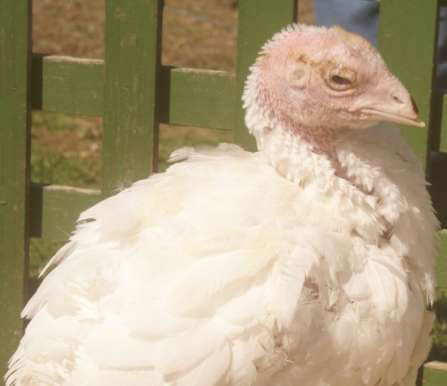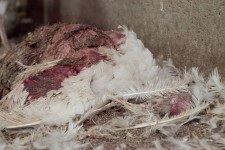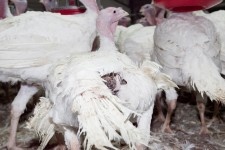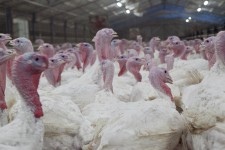- Overview
- Confinement
- Turkey poults
- Mutilation
- Artificial lighting
- Health Concerns
- Use of antibiotics
- Genetic alterations
- Muscle disorders
- Skeletal disorders
- Lame and injured birds
- Mortality rate
- Artificial insemination
- Health problems of breeders
- Slaughterhouse
- Turkeys: sentient and intelligent
- Conclusion
- References
Mutilation
Stress and frustration are endemic in factory-farmed conditions and turkeys can resort to neurotic behaviour such as feather plucking and even cannibalism. Farmers often manage cannibalism by cutting away a portion of the turkeys' beaks (debeaking), using a hot blade. The Australian Poultry Code of Practice which applies to domestic and commercially raised, poultry also allows the snood (skin drooping from the forehead), and the terminal segment of each inward-pointing toe in breeding males to be cut off.(13)
These surgical procedures are carried out when the turkeys are only a few days old without anaesthetic and without follow-up treatment for pain or infection. If such procedures were carried out on a cat or dog they would be illegal. Turkeys' beaks are delicate structures with an extensive nerve supply. They are sensitive to heat, pressure, and pain and are essential for normal drinking and eating, as well as preening.(14)
Following beak amputation, birds observed over a 56-week period have shown signs of depression and long-term chronic pain.(15) (See Figure 5). This pain is equivalent to that of a human amputee experiencing chronic 'phantom limb pain'.(16)
 Figure 5: An ex factory-farmed turkey poult, approximately three to four weeks old from a factory farm in Australia. The poult has been debeaked and has an injured head (scab) and an injured eye.
Figure 5: An ex factory-farmed turkey poult, approximately three to four weeks old from a factory farm in Australia. The poult has been debeaked and has an injured head (scab) and an injured eye.



